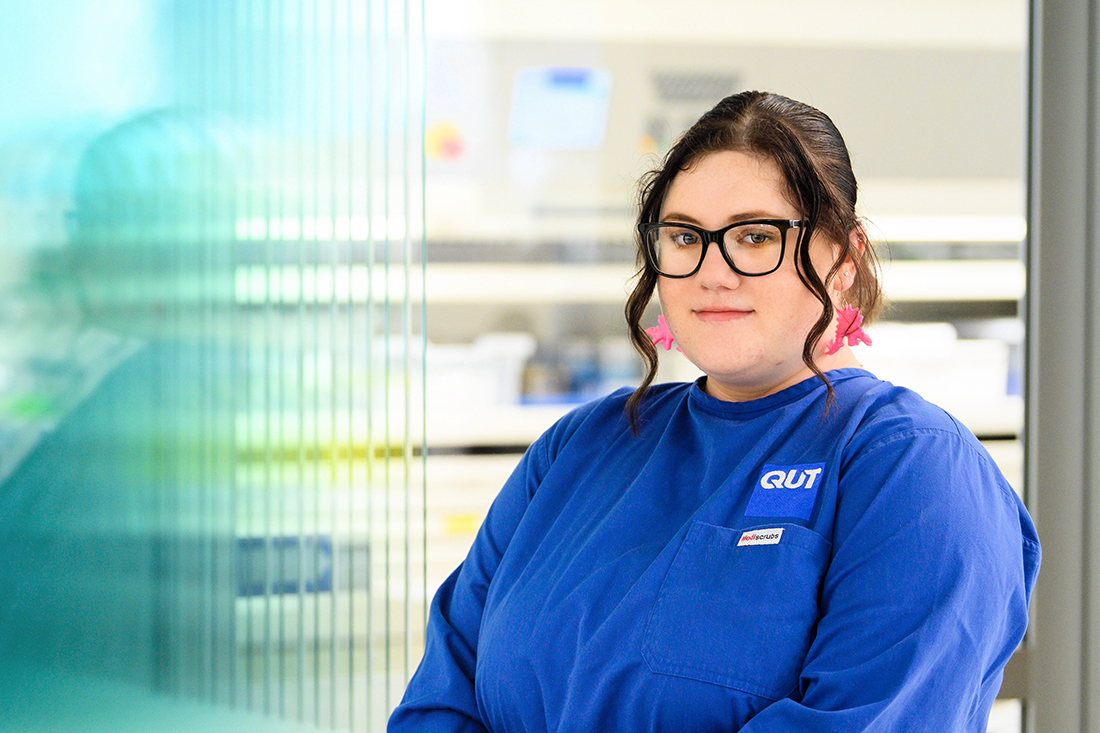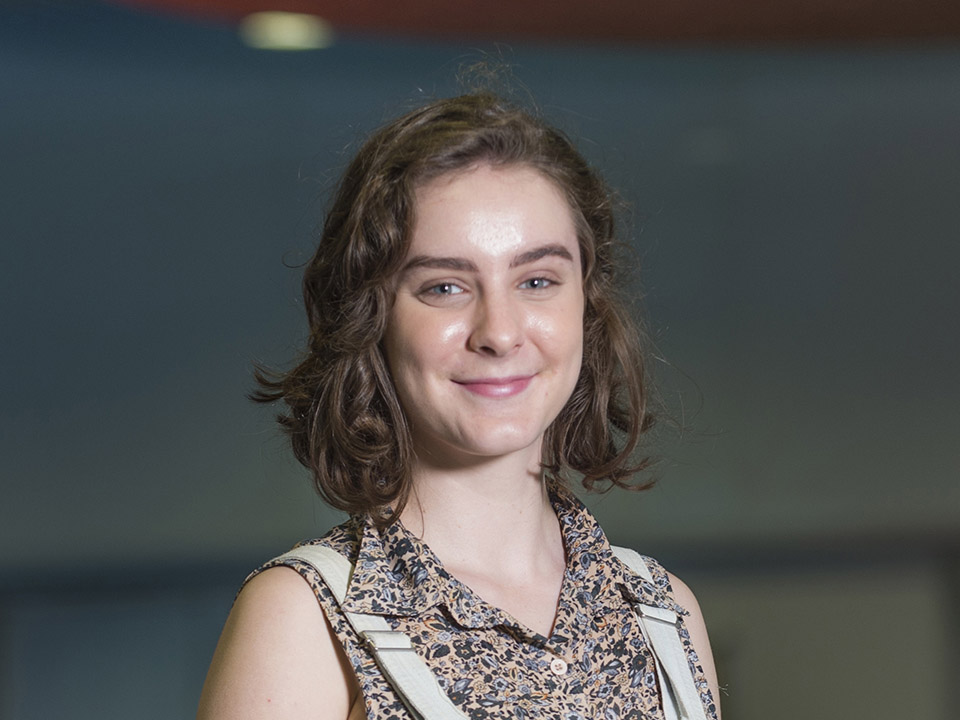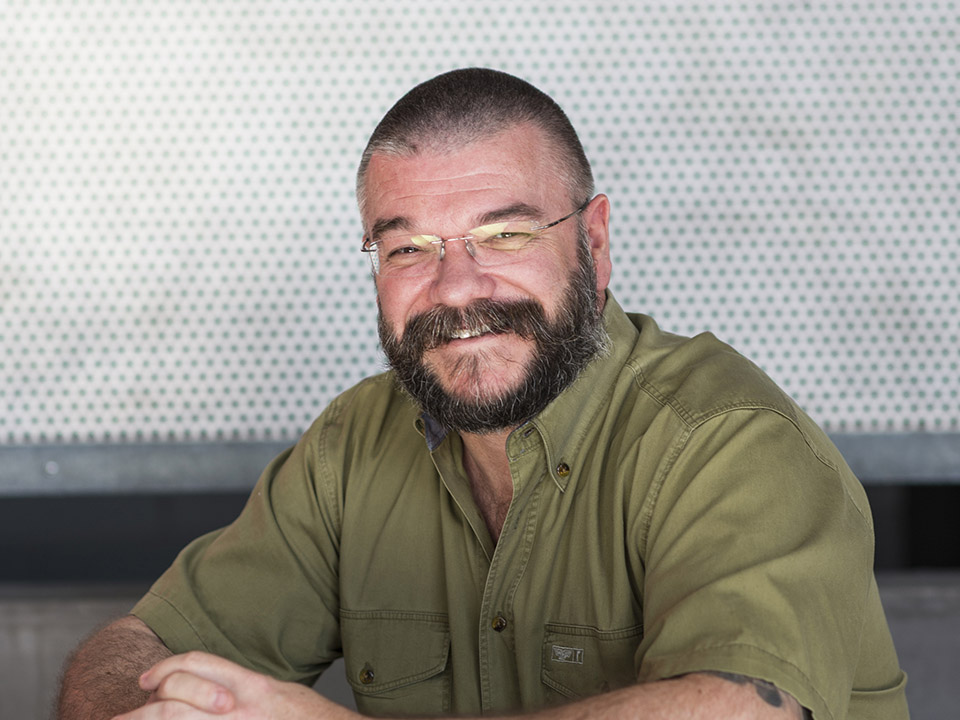Competitive edge
'I’m fascinated with the workings of the human body and passionate about contributing to the future of health care. QUT’s multidisciplinary approach and emphasis on hands-on research aligns with my career goals, and the Master of Data Science allows me to develop the quantitative skills I love. I think the vertical double degree will give me a competitive edge because of the relevance of statistics and data representation to the biomedical industry. This is a useful qualification for biomedical scientists and the course is extremely interesting.'
Bachelor of Biomedical Science/Master of Data Science
Inspiring Indigenous students
'I am a Kalkadoon woman from the tribe in Mount Isa and I'm studying the Bachelor of Biomedical Science. Some advice that I'd give to anyone interested in studying at QUT is to go for it. You never know how much you'll enjoy it until you actually get into the thick of it, and it's always different to what you expect.'
Competitive edge
'I’m fascinated with the workings of the human body and passionate about contributing to the future of health care. QUT’s multidisciplinary approach and emphasis on hands-on research aligns with my career goals, and the Master of Data Science allows me to develop the quantitative skills I love. I think the vertical double degree will give me a competitive edge because of the relevance of statistics and data representation to the biomedical industry. This is a useful qualification for biomedical scientists and the course is extremely interesting.'
Bachelor of Biomedical Science/Master of Data Science
Inspiring Indigenous students
'I am a Kalkadoon woman from the tribe in Mount Isa and I'm studying the Bachelor of Biomedical Science. Some advice that I'd give to anyone interested in studying at QUT is to go for it. You never know how much you'll enjoy it until you actually get into the thick of it, and it's always different to what you expect.'




In this course you will
- Position yourself ahead of the curve, graduating with dual bachelor degree and master degree qualifications.
- Save time and study costs by completing a Bachelor of Biomedical Science and Master of Data Science in just four years.
- Gain theoretical and practical skills in various biomedical disciplines, including genomics, cell and molecular biology, infection and immunity, biochemistry, anatomy and physiology.
- Learn from experts and develop knowledge and skills in advanced biomedical data analytics, including data mining methods, statistical modelling, statistical data analysis, modern biomedical technologies, software system development, and research methodologies.
- Study at Australia's leading research institution for data mining and analysis (Australian Research Magazine 2025).
- Be able to participate in comprehensive project-based experience to bring biological meaning to the translation of big data, allowing you to solve complex problems in biomedical science and healthcare.
In this course you will
- Position yourself ahead of the curve, graduating with dual bachelor and master qualifications.
- Save time and study costs by completing a Bachelor of Biomedical Science and Master of Data Science in just four years.
- Gain theoretical and practical skills in various biomedical disciplines, including genomics, cell and molecular biology, infection and immunity, biochemistry, anatomy and physiology.
- Study at Australia's leading research institution for data mining and analysis (Australian Research Magazine 2025).
- Learn from experts and develop knowledge and skills in advanced biomedical data analytics, including data mining methods, statistical modelling, statistical data analysis, modern biomedical technologies, software system development, and research methodologies.
- Be able to participate in comprehensive project-based experience to bring biological meaning to the translation of big data, allowing you to solve complex problems in biomedical science and healthcare.
Why choose this course?
Discoveries in biomedical science and data science underpin an exciting, rapidly evolving global bioindustry that is advancing both our understanding of human health and the diagnosis and treatment of disease.
An increased reliance on data in healthcare has created a clear need for biomedical science graduates who can use computational and statistical methods to generate, link, and interpret complex data sets.
Students of the Bachelor of Biomedical Science/Master of Data Science will develop diverse skill sets, combining an understanding of the complexity of the human body and the spectrum of health and disease with the application of bioinformatics, computer science, and statistical modelling.
Graduate with the knowledge and skills to lead innovation in emerging medical diagnostics and treatments, and pursue a career at the forefront of our understanding of public health, disease causes, and the promotion of evidence-based decision making for health practitioners and policy makers.
Explore this course
In the first two years of this program, you will gain knowledge of a wide range of biomedical disciplines and use these as the foundation for developing more advanced theoretical and practical skills in specialised biomedical science areas.
In the third year of the program, you will complete the embedded biomedical data analytics minor, preparing you to articulate into the Master of Data Science. The master will further your knowledge and skills in advanced biomedical data science, providing a deep understanding and practical experience in data modelling and interpretation.
As a graduate, you will have significant project-based experience and skills, enabling you to apply data science to solve complex problems in biomedical science and healthcare.
Customise your degree
Undergraduate component (Bachelor of Biomedical Science LV41)
As a Bachelor of Biomedical Science graduate, you will have a foundational knowledge of a wide range of biomedical discipline areas. This broad knowledge base will be the foundation for developing theoretical and practical knowledge in specialised biomedical science discipline areas.
You will have a high degree of course flexibility with the option to select a major or two minor areas of study that align with your interests and complement the embedded biomedical data analytics minor to prepare you for areas of current and emerging priority and employment.
The course significantly focuses on practical skills development; you will be in the laboratory from week one and working on real biomedical and scientific problems throughout the course.
Our flexible course design means you can shape the biomedical science portion of the course to suit your interests and career aspirations. Choose your major area of study from the list below.
Anatomical sciences
Build practical skills in organ identification, dissection, histology and medical image interpretation. Examine real examples from QUT’s extensive skeletal collection, film library, pathology museum, and human donor material.
Cell and molecular biotechnology
Study the cellular and molecular mechanisms that drive processes in normal and diseased tissues. Undertake laboratory research projects in cancer biology, tissue engineering, human stem cells and systems biology.
Human biochemistry
Study the structure, function, and properties of biomolecules and the molecular machinery that regulates the everyday workings of healthy cells and tissues at a metabolic level. Learn how diagnostic technologies and treatment strategies impact on biochemical processes in the cellular context.
Human physiology
Knowledge about how the human body systems work to maintain our health is essential to understanding the basis of disease, diagnostic technologies, and treatments. You can design and undertake a laboratory-based research project in human physiology.
Infection and immunity
Develop knowledge and understanding of infectious disease agents (bacteria, viruses, fungi, and parasites) and the role these organisms play in human health and disease, together with cutting-edge strategies of disease diagnosis, treatment, control, and prevention.
Postgraduate component (Master of Data Science IN31)
Applying bioinformatics, computer science, and statistical modelling continues to have a major impact on the biomedical sciences.
The Master of Data Science portion of this vertical double degree will prepare you for a future-focused career in the fast-paced, ever-changing world of data science. With a collaborative transdisciplinary curriculum, you will learn the theories and methods required to critically and collaboratively visualise, analyse and interpret real-world data to support informed decision-making across a range of applied areas.
You will study specialist units in advanced statistical data analysis, data mining techniques and applications, data manipulation, analytics for information professionals and advanced stochastic modelling.
The QUT Master of Data Science meets industry needs by integrating statistics, computer science, and business process management expertise to provide practical learning opportunities. In the Master of Data Science, you will:
- build a significant project-based experience that allows you to apply your analytical skills to complex problem domains constructively
- experience applying high-order thinking strategies within data-rich contexts through synthesising multiple sources of information
- apply specialist abstraction and synthesis techniques to solve complex data analytics problems inspired by real-world scenarios.
As a graduate of the Master of Data Science portion of this vertical double degree, you will understand how data is ubiquitous in our society and value the need to act ethically, socially responsibly, and inclusively. You will have significant project-based experience and high-order thinking strategies, allowing you to apply data science skills to solve complex problems in biomedical science and healthcare.
Careers and outcomes
Professional recognition
Depending on the units selected in final year, graduates of the Bachelor of Biomedical Science will be eligible for membership into one or more of the following organisations:
- Australian Society for Medical Research
- Australian and New Zealand Society for Cell and Developmental Biology
- Australian Society for Biochemistry and Molecular Biology
- Australian Association of Clinical Biochemists
- Australian Society for Microbiology, Australian Neuroscience Society
- The Endocrine Society of Australia, Society of Reproductive Biology
- Australian and New Zealand Association of Clinical Anatomists
- Australian and New Zealand Bone and Mineral Society
- Australian and New Zealand Forensic Science Society.
Course articulation
You will first enrol and study in the LV41 Bachelor of Biomedical Science component of the program. Approximately two weeks after successful completion of LV41 Bachelor of Biomedical Science you will receive an offer to enrol and study the Master of Data Science component of the program.
Possible careers
- Biochemist
- Biomedical laboratory officer
- Biomedical science researcher
- Biostatistician
- Biotechnology scientist
- Cardiac and vascular scientist
- Clinical data manager
- Data analytics specialist
- Data scientist
- Health researcher
- Laboratory manager
- Medicine (after further study)
- Neurophysiologist
- Reproductive technician
- Respiratory scientist
- Statistician
This vertical double degree is made up of LV41 Bachelor of Biomedical Science plus IN31 Master of Data Science. You will be able to progress on to the Master of Data Science upon successful completion of the bachelor degree. The full vertical double degree normally takes 4 years to complete full-time (3 years for the bachelor component plus 1 year for Master component).
To meet the requirements of the Bachelor of Biomedical Science component of the vertical double degree, you must complete a total of 288 credit points. You may choose to undertake:
The Bachelor of Biomedical Science consists of 288 credit points of study, with the structures comprising:
Biomedical Science Major strand option
- 84 credit points of core biomedical science studies;
- 72 credit points of studies in the student's chosen Study Area A;
- 72 credit points of specified elective studies;
- 48 credit point core Biomedical Data Science Minor minor comprising preparatory postgraduate units; and
- 12 credit points of QUT You units
OR
Biomedical Science Minor strand option
- 84 credit points of core biomedical science studies;
- 96 credit points of complementary studies. The 96 credit points of complementary studies comprises two minors of 48 credit points each;
- 48 credit points of specified elective studies.
- 48 credit point core Biomedical Data Science Minor comprising preparatory postgraduate units;
- 12 credit points of QUT You units
This vertical double degree is made up of LV41 Bachelor of Biomedical Science plus IN31 Master of Data Science. You will be able to progress on to the Master of Data Science upon successful completion of the bachelor degree. The full vertical double degree normally takes 4 years to complete full-time (3 years for the bachelor component plus 1 year for Master component).
To meet the requirements of the Bachelor of Biomedical Science component of the vertical double degree, you must complete a total of 288 credit points. You may choose to undertake:
The Bachelor of Biomedical Science consists of 288 credit points of study, with the structures comprising:
Biomedical Science Major strand option
- 84 credit points of core biomedical science studies;
- 72 credit points of studies in the student's chosen Study Area A;
- 72 credit points of specified elective studies;
- 48 credit point core Biomedical Data Science Minor minor comprising preparatory postgraduate units; and
- 12 credit points of QUT You units
OR
Biomedical Science Minor strand option
- 84 credit points of core biomedical science studies;
- 96 credit points of complementary studies. The 96 credit points of complementary studies comprises two minors of 48 credit points each;
- 48 credit points of specified elective studies.
- 48 credit point core Biomedical Data Science Minor comprising preparatory postgraduate units;
- 12 credit points of QUT You units
- Course code
- LV41
- QTAC code
- 419732
- CRICOS code
- 052768K
-
- Gardens Point
-
- Gardens Point
- 4 years full-time
- 8 years part-time
- 4 years full-time
- February
- February
Assumed knowledge
Before you start this course, we assume you have sound knowledge of the subject/s listed below. If you don't have the subject knowledge, you can still apply for the course but we strongly encourage you to undertake bridging studies to gain the knowledge:
- Biology (Units 3 & 4, C)
- English, or Literature, or English and Literature Extension, or English as an Additional Language (Units 3 & 4, C)
- Mathematical Methods, or Specialist Mathematics (Units 3 & 4, C)
Offer guarantee
If you achieve an ATAR or selection rank of 80.00 or higher (including any adjustments) and satisfy all other admission requirements, you are guaranteed an offer for this course.
VET guarantee
If you have completed an AQF diploma or higher, and satisfy all other admission requirements, you are guaranteed an offer for this course.
Advanced standing
If you have prior studies or work experience, you may be eligible for advanced standing (credit). You can apply for advanced standing once you've been accepted to QUT. If you're in your first semester of study, you must apply for advanced standing within 10 days of receiving your offer.
Deferment
You can defer your offer and postpone the start of your course for one year.
More about deferring your offer
Adjustments to your ATAR/selection rank
Any adjustments you receive to your ATAR or selection rank will be applied to this course.
Find out if you’re eligible for an adjustment to your ATAR or selection rank
Offers we made to school leavers in Semester 1, 2024
The figures listed in the tables below reflect the offers that were made to recent ATAR students. The entry thresholds box at the top of this page shows the lowest adjusted ATAR/selection rank required to receive an offer for all applicants for the most recent January QTAC offer round.
| Excluding adjustments | Including adjustments | |
|---|---|---|
| Highest ATAR/selection rank to receive an offer |
Selection rank
98.05
|
Selection rank
99.95
|
| Median ATAR/selection rank to receive an offer |
Selection rank
86.75
|
Selection rank
88.65
|
| Lowest ATAR/selection rank to receive an offer |
Selection rank
78.90
|
Selection rank
80.90
|
You can find out more about your fellow students’ backgrounds with this course’s student profile.
Other admission options
If you are of Aboriginal or Torres Strait Islander descent, you may be eligible for admission through our Centralised Assessment Selection Process (CASP).
I completed my studies outside of Australia
Select the country where you completed your studies to see a guide to the grades you need to apply for this course.
If your country or qualification is not listed, you can still apply for this course and we will assess your eligibility.
Assumed knowledge
- Biology (Units 3 & 4, C)
- Mathematical Methods, or Specialist Mathematics (Units 3 & 4, C)
You must have achieved this study at a level comparable to Australian Year 12 or in recognised post-secondary studies.
I completed secondary school in Australia
Assumed knowledge
Before you start this course we assume you have sound knowledge in these areas:
- Biology (Units 3 & 4, C)
- Mathematical Methods, or Specialist Mathematics (Units 3 & 4, C)
Offer guarantee
If you completed secondary school in Australia and achieve an ATAR/selection rank of 80.00 or higher (including any adjustments) and satisfy all other admission requirements, you are guaranteed an offer for this course.
VET guarantee
If you have completed an AQF diploma or higher, and satisfy all other admission requirements, you are guaranteed an offer for this course.
Minimum English language requirements
Select the country where you completed your studies to see a guide on meeting QUT’s English language requirements.
Your scores and prior qualifications in English-speaking countries are considered. Approved English-speaking countries are Australia, Canada, England, Ireland, New Zealand, Scotland, United States of America and Wales.
If your country or qualification is not listed, you can still apply for this course and we will assess your eligibility.
We accept English language proficiency scores from the following tests undertaken in a secure test centre. Tests must be taken no more than 2 years prior to the QUT course commencement.
| English Test | Overall | Listening | Reading | Writing | Speaking |
|---|---|---|---|---|---|
| IELTS Academic / One Skill Retake | 6.5 | 6 | 6 | 6 | 6 |
|
Cambridge English Score
You must share your results with QUT through the Candidate Results Online website. |
176 | 169 | 169 | 169 | 169 |
| PTE Academic | 58 | 50 | 50 | 50 | 50 |
| TOEFL iBT | 79 | 16 | 16 | 21 | 18 |
Don't have the English language score you need? We can help!
We offer English language programs to improve your English and help you gain entry to this course.
When you apply for this course, we will recommend which English course you should enrol in.
Your actual fees may vary depending on which units you choose. We review fees annually, and they may be subject to increases.
2025 fees
2025: CSP $9,400 per year full-time (105 credit points)
2025 fees
2025: $52,200 per year full-time (105 credit points)
Student services and amenities fees
You may need to pay student services and amenities (SA) fees as part of your course costs.
HECS-HELP: loans to help you pay for your course fees
You may not have to pay anything upfront if you're eligible for a HECS-HELP loan.
You can apply for scholarships to help you with study and living costs.
Keep up to date
QUT courses for you
Like to save your courses?
Please enter your first name and email so we can save your courses for you



